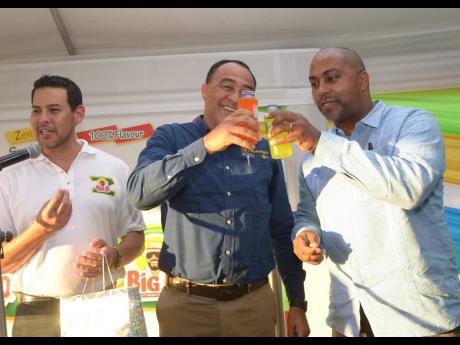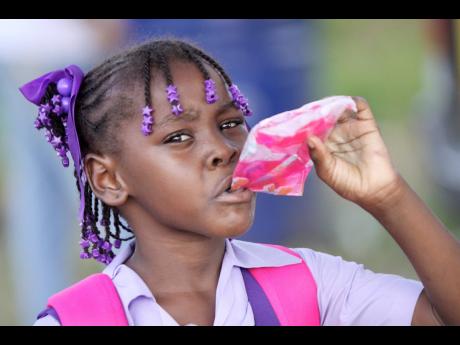Low-sugar rejection
Pinched by COVID and regulations, small beverage traders recalibrate market channels for cheap drinks
The pandemic has led to plummeting sales for drink products aimed at bargain consumers, and may very well have been the last straw that drove Spike Industries into closing down the bag-drink manufacturing division of its beverage business. The...
The pandemic has led to plummeting sales for drink products aimed at bargain consumers, and may very well have been the last straw that drove Spike Industries into closing down the bag-drink manufacturing division of its beverage business.
The struggle for some drink companies started back in 2019, when it became mandatory for the sugar content in beverages supplied to schools and public health centres to be lowered to no more than six grams of sugar per 100 ml drink packages, an initiative meant to help counteract the trend towards obesity.
The problem for them was that the consumers they serve tend to have a sweet tooth. Instead of acculturating to less sugar, drinks producers say they are seeing a migration of their customers towards products that don’t conform to the regulations.
The sugar content was again lowered to 4 grams per 100 ml in January, and will face a further cut to 2.5 grams in January 2023.
“Everyone in the industry wants healthier choices for the children, but the students are the ones who are going to make the choice about if they want to drink it or not,” said Brett Wong, managing director of Coldfield Manufacturing Limited, the maker of Big Jo and other brands.
“Coming from something that had more sugar in it, there was a lot of adjustment. So the reformulation was quite a mixed bag, to be honest … the students would just leave the school and walk over to the vendor across the street selling the drinks that were not reformulated,” he told the Financial Gleaner.
Among the traders in bagged juices, Coldfield Manufacturing was the first to market with the reformulated, low-sugar drink Big Jo and Fruit Jazz brands. The company moved quickly to conform with the regulations as the majority of the sales from its bag drink division, pre-COVID, came from school canteens.
The remainder was split among street vendors, wholesalers, low-end restaurants and community shops.
Time and COVID have dampened Coldfield’s initial outlook for the reformulated products, with the suspension of the student market since the pandemic, due to the migration of educational lessons and learning from school complexes to living rooms and computer screens.
Cal’s Manufacturing, the maker of Cal’s wines, bag drinks, ketchup and syrup products, made a different calibration than Coldfield. In an interview with the Financial Gleaner, Managing Director Stacy-Ann Miller said her company had determined that the switch to low-sugar drinks for the school market would be too expensive for the low-margin product.
Instead, the company decided to switch market channels to which the regulation did not apply – community shops. That decision, said Miller, turned out to be better choice in the short term, given the lockdown of schools just over a year later as the coronavirus spread.
“We did not change our formula because that would have interfered with the profile of our product. Our bag drink business has been doing well despite COVID. In fact, we have seen double digit growth in sales from more children being at home,” the MD said.
Bag juices – also known referred to as ‘juice in a pouch’ or bag drinks – are cheaply packaged in clear plastic bags, and sell for around $35. Comparatively, box drinks sell for around $90. The bag or pouch product represents 60 per cent of Cal’s production. Coldfield Manufacturing, which is also the producer of upmarket juice brands Pure Country and Country Style, apportions some 20 per cent of its resources to the production of bag drinks. Coldfield has reduced its bag-juice operation to 12 per cent of output, but plans to ramp back up once the market normalises.
Spike Industries, the producer of the Farmer Brown, Soyalushus, Inseason, Ripple and Purewater beverage brands, has taken a more drastic approach, exited the bag drink manufacturing business altogether, around mid-year 2020. The company has not returned calls seeking comment on the move, which reportedly happened during the height of the pandemic, about what bearing the low-sugar regulations had on the decision.
However, Spike Industries remains in the bag juice trade as a seller of Cal’s bagged product. The two companies had brokered the distribution deal prior to the outbreak of COVID-19.
Like Spike and Cal’s, Coldfield has turned to community shops as an indirect route to children being schooled at home. But Wong says it’s becoming increasingly difficult to keep revenue flows from that market steady, because of emerging rivalry.
Displacements caused by COVID-19, manufacturers say, have birthed opportunities for some shopkeepers to move into informal bag drink-making businesses; while some home-bound families sell drink pouches, as a means of income.
“There is still some market in the communities, but then people have been trying to save money so they have been looking at alternatives like syrups,” said Wong.
“There has also been some demonisation around drinks in a pouch for no real reason and greater need for drinks in bottles. But the truth is that drinks in a pouch, especially if it is from a reputable brand like Big Jo, is better value for money and is more environmentally friendly,” Wong said.
In response to market changes, Coldfield says it has been educating consumers about its products, and will be rolling out new juice drinks to the market under the bag-drink line to increase its market share.
Once schools reopen, the company will ramp up back production of bag juices, he said.
“We have seen some return in sales of the Big Jo brand with the phased reopening of schools and we trust that we’ll see things slowly returning to normal in the latter part of the year,” he said.
The bag drink market still has an unverified number of players operating both legally and illegally. The Ministry of Health wants to bring more of drinks producers into compliance with the new health standards, and is continuing the outreach through a series of workshops slated for June 22, July 1 and July 2.
The workshops will cover guidelines for beverage in schools and health facilities, beverage reformulation, sugar reduction and label requirements.


